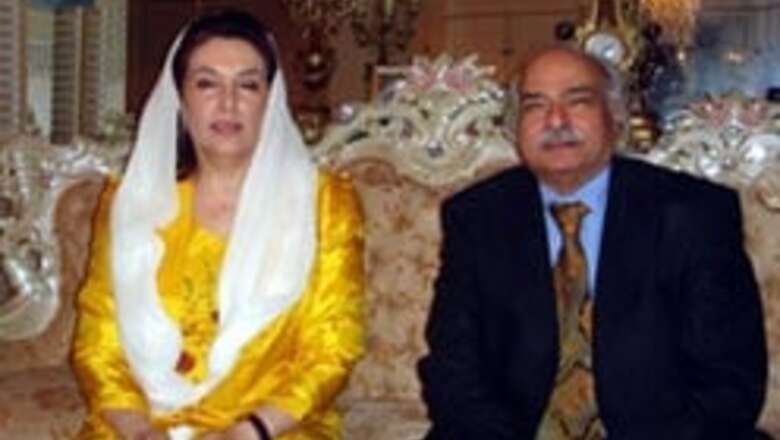
views
The author of the article, Wajid Shamsul Hasan is close friend of PPP Co-Chairman, Asif Ali Zardari and late Pakistan prime minister, Benazir Bhutto. He was a former UK ambassador from Pakistan and has also written Benazir Bhutto's last will. The views and ideas expressed in this article are entirely his own.
An out of context quote of PPP Co-Chairman Senator Asif Ali Zardari in a section of the media about Kashmir dispute recently stirred a strong Kashmiri reaction on both sides of the divide and of course the diaspora. Many Kashmiri leaders-quite a few of those who are puppets on the strings of invisible hands-jumped to their guns. Without realising the unimpeachable commitment of PPP and the Bhuttos to the Kashmiri cause-they became tools in the hands of those who were defeated in the elections despite selective rigging and overwhelming support from the President. A number of pen-pushers too joined the chorus. For them any bad news is good news. Any quote that can be twisted and turned is a ball game for them.
Notwithstanding the strategic national interests of Pakistan, what is good for its survival and honourable existence — from its inception PPP has sustained all through history a Kashmir policy that seeks the core issue's solution on the basis of right of self-determination. Without prejudice to the UN resolutions for plebiscite in Kashmir the PPP has sought to settle the dispute through bilateral negotiations. And at no stage-while discussing various options, it has never indulged in about turns on the matter as a tactical methodology that General (Retd) Musharraf has often resorted to.
During his ten-years in his office-both as chief of army staff and as President, we have seen him float various "solutions" including a seven-division formula and categorical abandoning of the UN resolutions granting right of self determination to the people of Kashmir. Being a commando and a military general he even followed into the footsteps of Field Marshal Ayub Khan (the author of Operation Gibraltar in 1965) and did his own Kargil operation that also failed with most deplorable consequences. Ayub rushed to blame Pakistan Foreign Office under Foreign Minister Zulfikar Ali Bhutto for his military fiasco and went all the way to Tashkent to sign a most humiliating treaty with India under the aegis of the erstwhile Soviet Union. Musharraf went on to repeat history. While he was the sole author of Operation Kargil, when he failed he made Prime Minister Nawaz Sharif responsible for it. It is another story that Nawaz Sharif saved Musharraf's second skin and got American President Clinton's timely intervention to avert a full-scale war with India.
His Kargil's Pyrrhic misadventure was part of his overall Kashmir strategy before he committed series of about-turns in the post 9-11 period. He had laid bare his policy vis-à-vis India on April 11, 1999 addressing the English Speaking Union in Karachi just five months before ousting Prime Minister Nawaz Sharif. He came on record following the then Prime Minister Atal Bihari Vajpayee's "historic bus yatra" to Lahore that Nawaz Sharif-Vajpayee Lahore Declaration seeking a 'composite dialogue process' was nothing but 'hot air'. In his speech Musharraf had summed up, "India is a hegemonic power. Low-intensity conflict with India will continue even if the Kashmir issue is resolved."
His seven-division formula had made it an extraordinary feat of exclusive diplomatic bravado since he had kept his Foreign Office and his Foreign Minister in the dark about it. Only person who was privy to his magic solution of Kashmir dispute was APHC leader Maulvi Mirwaiz Umar Farooq with whom Musharraf had shared it under the glare of the famous red lights of the city of Amsterdam where the two had met. It was otherwise a top secret. This formula also signalled the formal burial of Pakistan's traditional stand on Kashmir based on the UN resolutions.
Some known quarters who had been kept fed by the Pakistani intelligence had described his proposal as a giant step forward towards confidence building measure with Delhi, Prime Minister Manmohan Singh, however, did not mince his words in putting it straight: "I have made it clear to President Musharraf that any redrawing of the international border is not acceptable to us. Any proposal which smacks of further division is not going to be acceptable to us."
Musharraf has been indulging in lot of deception vis-à-vis Kashmir while PPP has been very clear and committed to the cause and its just and honourable solution. Shaheed Zulfikar Ali Bhutto parted his ways with Ayub over his handling of Kashmir at Tashkent. And despite Pakistan army's total and most humiliating defeat in 1971 war when Zulfikar Ali Bhutto went to Shimla (1972) as the leader of a vanquished and fractured nation to negotiate peace treaty with the Indian Prime Minister Indira Gandhi-he managed to get a most honourable outcome. Shimla Agreement ushered longest ever peace in the region until now, except periods of stands off, especially the Kargil misadventure. Zulfikar Ali Bhutto did agree for bilateral negotiations on the Kashmir issue without of course prejudice to the UN resolutions as well as not conceding Pakistan's right to seek UN intervention in case bilateral talks failed. He also recovered West Pakistan's 5000 square miles of territory captured by the Indian army.
During General Zia's time, the Kashmir issue was put in cold-storage and almost forgotten by a man who wanted to keep India in good humour by his back-bended, hands-folded-tooth-paste-ad smile cricket diplomacy. Kashmir was pulled out of the back burner and brought on the centre stage as a human rights issue by martyred Mohtarma Benazir Bhutto when she became prime minister although generals like Hamid Gul conspired against her. She was responsible for getting APHC observer status at OIC and other international forums. When she appointed me High Commissioner to London her brief of priorities was to develop trade with Britain, mobilise foreign investment and internationalise Kashmir issue as a human rights issue where UN resolutions were flouted.
PAGE_BREAK
As leader of opposition she never abandoned the cause of Kashmiri people, made it a point to speak about it whenever she had an opportunity. However, with the turn of global events following 9-11 and the Kargil misadventure by Pakistan that could have caused a nuclear war, she developed a new approach to handling the Kashmir dispute by ushering in confidence building measures between India and Pakistan, softening of the borders, inter-state trade, increase in flow of visitors etc-- without prejudice to the UN resolutions on the Kashmir issue. She had pleaded that India and Pakistan should not tag one issue with the other. Kashmir was to be resolved through confidence building measures while on the other she stressed the need of developing bilateral trade and exchanges. And the two should be separated from each other and that one should not be affected by the lack of process in the other.
It was much similar to Sino-Indian relations following the 1962 war over a border dispute. Though the two countries have yet to resolve the issue that took them to war but despite that they have continued develop trade and other ties to the mutual benefit of the people of the two countries. As a matter of fact, she had pleaded for converting SAARC into a structure like European Common Market (ECC) with the ultimate objective of making SAARC countries a Union of South Asian Nations.
For blueprinting her vision for an altogether peaceful, progressive and economically vibrating region Musharraf had let loose his blood thirsty hounds like Ejazul Haq, Sheikh Rashid and Mohammad Durrani on her to dub her as a "security risk". It must have been rather ironic for his cronies to see him copy much of Shaheed Mohtarma's vision. When he distanced himself from cross-border terrorism and jihadi, Lashkari organisations on Washington's orders, he would not have made himself an utter fool had he listened to her advice when she had asked him to give up his sponsorship to the terrorists much before 9-11.
Musharaf's went beyond her vision by "setting aside" of the UN resolutions. On the other hand the Pakistan Peoples Party Kashmir policy under her did not bargain on the UN resolutions relating to Kashmir as it believes that any bargaining on this is going to create a backlash amongst the Kashmiri people. Rather, she gave an alternative vision of moving South Asia on to the path of peace and prosperity through conflict management with a view to creating a trading bloc of nations that can improve the living conditions of all people of South Asia.
President Musharaf's alleged "sell-out" options had smacked more of oneupmanship due to Mohtarma Benazir Bhutto's vision of peace with honour and self respect. The Musharaf regime-all thorough its ten years-- lacked a coherent vision and its response to the challenge appeared more bizarre. If we look at Kashmir issue--it remains stalemated despite Musharaf's offer to drop the sanctity of the UN Resolutions in return for nothing from New Delhi.
Mr Zardari's out of place quote from CNN-IBN interview should be read in the light of the above background and the vision of the Mohtarma Benazir Bhutto. It must be recalled that the PPP believes that progress in talks with India must be based without prejudice to the United Nations Resolutions on Kashmir and that a step by step approach will make people in all parts of South Asia appreciate the importance of good relations thus breaking a past marred by détente followed by conflict.
PPP spokesman Farhatullah Babar has done right by setting the record straight by reiterating that Pakistan Peoples Party is committed to resolution of the Kashmir dispute and normalization of relations with India on the basis of respect and honour. Referring to Senator Asif Ali Zardari's interview, Babar maintains that he articulated Party's position. PPP believes in conflict management and simultaneously creating a trading bloc of nations to improve living conditions of people of South Asia and at the same time enhance confidence as key to resolution of outstanding issues. The PPP is of the view that peace requires patience and that confidence building measures are required to create a climate for durable peaceful relations, he said.
Babar's reassertion that the PPP is in favour of normalization of relations with India as well as enhancement of SAARC as a trading bloc is in keeping with the vision of Bhutto. She had herself proposed soft borders as far back as 1999. Earlier the PPP introduced the South Asian Preferential Tariff Agreement as well as the concept of visa free travel in SAARC for Parliamentarians and Judges. It is the PPP and its martyred leader's vision that while not giving up unilaterally the UN resolutions, we should also not let any single issue hold hostage the relations in the South Asian subcontinent. That was the reason that progress on Indo-Pak issues had been substantive and durable during PPP tenures as is evidenced by the Shimla Agreement, the Non-attack on each other nuclear facilities and the South Asian preferential Tariff that took place during PPP tenures.
The PPP, however, sees the people of Kashmir as key to a final settlement of the Kashmir issue. It believes that as a party of the masses it is in a position to build an internal consensus on a durable peace with its neighbour on the basis of honour and self respect. No doubt the fate of one billion people of South Asia hangs in the balance. It is the people, and the people alone, who can decide about the future of South Asia. An enduring peace demands that South Asia move forward with the support and blessings of the true representatives of the people.




















Comments
0 comment